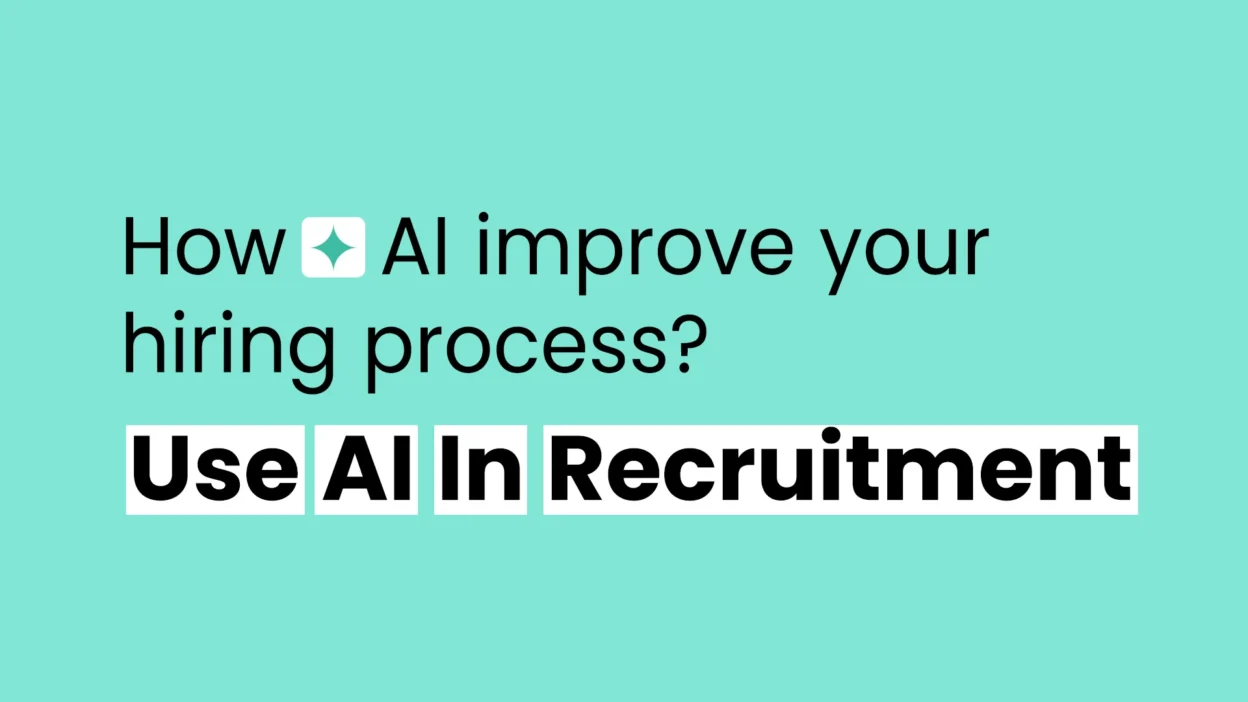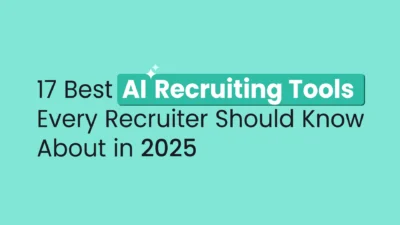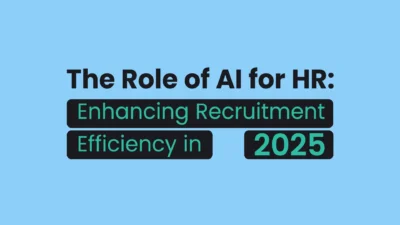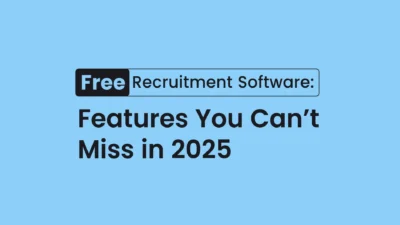AI has already changed many aspects in business management, one of which is the hiring process. Organizations are growing really fast and they need new staff, on the other hand there are lots of people seeking a proper job. How to manage the great number of candidates for a job? AI can do it for you. AI tools can observe candidates, assess their skills, reduce the hiring time, and even predict a candidate’s job success!
On the other hand, using AI in recruitment also comes with challenges, such as potential biases and lack of human touch.
In this article, we will cover the advantages and disadvantages of AI in recruitment, how AI makes the recruitment process easier, and how it helps in reducing biases, along with its limitations.
Table of Contents
Pros and Cons of Using Artificial Intelligence in the Hiring Process
AI in recruitment offers numerous advantages, yet it also presents challenges. Here’s a balanced look at its benefits and drawbacks:
Adventages
- Efficiency and Speed: AI-powered tools significantly reduce the time you need to hire someone, by automating resume screening and initial candidate assessments. Imagine an HR manager sifting through 500 resumes manually! Ai In Recruitment does it in seconds.
- Data-Driven Decisions: Ai In Recruitment can analyze vast amounts of data to identify the best candidates, minimizing human errors. It’s like having an HR genius that never sleeps or needs coffee
- Cost-Effectiveness: Automating repetitive tasks saves recruitment costs by decreasing the need for a large HR team. No more overworked recruiters drowning in paperwork.
- Better Candidate Matching: AI-driven algorithms improve talent acquisition by matching job descriptions with candidates’ skills and experience. It’s like a dating app but for jobs! just fewer awkward first meetings.
- Bias Reduction: AI removes subjective decision-making, bringing up a more diverse and inclusive hiring process. Finally, hiring without falling for that “gut feeling” bias.
Magical Resume Score
Discover everything you need to know about Magical Resume Score , how it evaluates your resume, and the various options available to enhance your job application and improve your chances of success.
Disadvantages
- Lack of Human Touch: AI lacks emotional intelligence and may overlook candidates who excel in soft skills. No machine can read between the lines of a hesitant but brilliant candidate.
- Potential Biases: AI algorithms can recklessly reinforce biases present in historical hiring data. If it learns from biased hiring, it could become an unintentional gatekeeper.
- Data Privacy Issues: AI recruitment tools rely on large volumes of candidate data, raising concerns about data security and privacy. Nobody wants their resume floating around in the AI atmosphere.
- Dependence on Algorithms: Over-reliance on AI may lead to a lack of creativity in hiring, as human intuition is sometimes necessary for selecting the right candidate. After all, some talents don’t fit into neat algorithmic boxes.
More: Why Every Recruiter Needs an AI Recruiting Assistant?
How is AI Used in Recruitment?
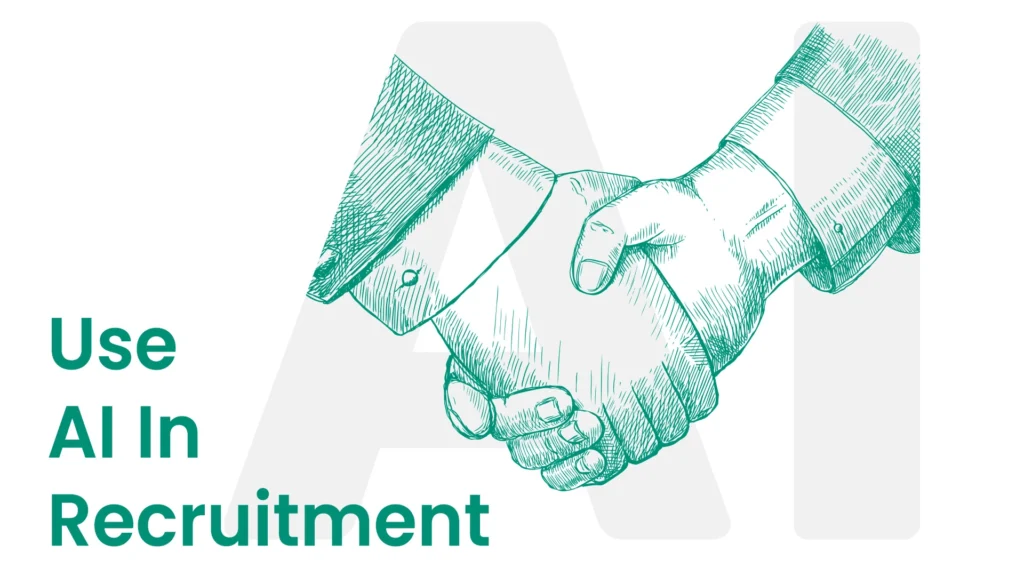
AI in recruitment is used in many steps to optimize the hiring process. Some of its primary applications include:
- Talent Sourcing: Ai In Recruitment can skim job boards, social media, and professional networking sites to find potential candidates.
- Predictive Analytics: AI analyzes past hiring trends to predict which candidates are most likely to succeed in a role.
- Skill Assessment: You can conduct tests via AI. These tests evaluate candidates’ skills through gamified assessments and simulations.
- Onboarding Automation: AI helps in automating onboarding tasks, such as document verification and training.
Automated Hiring & Process
Ai In Recruitment has introduced automation to the recruitment process, streamlining hiring from sourcing to onboarding. Several AI-driven hiring technologies are transforming the landscape:
1. Resume Screening Software
AI tools analyze thousands of resumes in seconds. They filter candidates based on required qualifications and experience. These tools use Natural Language Processing (NLP) to scan resumes for relevant keywords, to make sure only the best-matched candidates move forward.
For example, A company that wants to hire software engineers, can use AI to scan for specific programming languages and relevant project experience. The downside? If a talented coder describes their Python skills as “serpent whisperer,” (never do that!) the AI might just pass them by.
Pros:
- Saves HR teams hours of manual screening.
- Identifies hidden talent that might be overlooked manually.
Cons:
- Can filter out non-traditional candidates who do not use standard industry keywords.
- May favor resumes with AI-optimized formatting, disadvantaging some applicants.
Read More About Future of AI in recruitment
2. AI Chatbots for Candidate Engagement
Chatbots like Mya and XOR enhance candidate experience by answering queries, scheduling interviews, and providing real-time updates about the hiring process.
Pros:
- Ensures consistent and instant communication.
- Reduces the workload on recruiters.
Cons:
- Lacks personalization in candidate interactions.
- Can struggle with nuanced or complex candidate questions.
Read More: What Are the Pros and Cons of AI in Recruitment?
3. AI-Powered Video Interviewing
Tools like HireVue and Talview use AI to assess facial expressions, voice modulation, and word choice to evaluate candidates’ suitability for a role. Ai In Recruitment analyzing a candidate’s enthusiasm can help identify highly engaged individuals but also needs to be calibrated correctly. For instance, a naturally monotone speaker who is highly skilled shouldn’t be overlooked simply because they don’t display traditional excitement. Companies like Unilever have tackled this challenge by refining their AI interview tools to focus on content rather than tone, ensuring they don’t miss out on top talent.
Pros:
- Helps assess soft skills such as communication and confidence.
- Eliminates scheduling conflicts with automated interviews.
Cons:
- Raises ethical concerns about privacy and data security.
- Can introduce bias if trained on non-diverse datasets.
Read More: How AI Are Revolutionizing AI Software Development?
How Can AI Reduce Bias in Recruitment?
AI can reduce bias in the recruitment process and this is one of the most significant advantages it has. There might be a great deal of unconscious human biases while shortlisting candidates and this is the main cause of not having a diverse workplace.
AI can solve this issue by:
- Blind Screening: AI removes identifiable information like names, gender, and age from resumes, ensuring candidates are selected based on skills and experience rather than demographics.
- Standardized Assessments: AI assessments evaluate candidates objectively using data driven metrics rather than personal judgment.
- Diverse Talent Pools: AI searches for talent from underrepresented groups, enlarges the candidate pool, and promotes inclusion.
- Bias Auditing: AI systems can be programmed to track and correct biased decision making patterns, ensuring fair hiring outcomes.
Read More: The Role of AI for HR
What Are the Challenges of Using AI in Hiring Processes?
Although AI has all these benefits, Using it in the hiring process is not without its challenges. Organizations must address the following concerns:
- Ethical and Privacy Issues: Ai In Recruitment tools collect vast amounts of data, making them vulnerable to privacy breaches and ethical dilemmas regarding data usage. Companies using AI must be really careful about choosing a safe tool for their purpose.
- Lack of Transparency: AI’s decision making processes can be vague so it might be difficult to understand why certain candidates were rejected.
- Algorithmic Bias: If AI is trained on biased data, it can maintain existing hiring gaps instead of erasing them. So, training is a very important part of using such tools.
- Resistance to Change: HR professionals may be afraid of relying on AI decision-making. They might be concerned about job displacement or loss of control.
- Technical Limitations: Ai In Recruitment is still evolving, and it cannot fully reflect human intuition, creativity, and emotional intelligence.
Conclusion for Ai In Recruitment
AI in recruitment is revolutionizing the hiring landscape by enhancing efficiency, reducing bias, and improving candidate experience. From resume screening to AI-powered interviews, automated hiring processes are helping companies make better hiring decisions. However, organizations must address challenges such as AI bias, ethical concerns, and privacy risks. By blending AI efficiency with human insight, companies can build a hiring process that is both smart and humane.
MagicalAPI’s Resume Score uses AI to assess the clarity, structure, and impact of your resume, freeing recruiters from mundane checks so they can focus on what truly matters—evaluating talent. By automating routine tasks, it empowers technology to enhance human judgment rather than replace it—because, at its core, hiring is about people, not just algorithms.
Common Questions about Ai In Recruitment
What is AI in recruitment and how does it work?
AI in recruitment leverages machine learning and natural language processing to streamline various hiring processes. It automates tasks such as resume screening, candidate sourcing, and scheduling interviews, thereby reducing manual effort and increasing efficiency. These systems analyze data from resumes and job descriptions to identify the best-fit candidates based on skills, experience, and even cultural compatibility. This enables recruiters to focus on more strategic elements of talent acquisition.
What benefits does using AI in recruitment offer?
The use of AI in recruitment brings numerous benefits. It significantly cuts down on the time spent on manual resume screening and candidate sourcing, resulting in faster hiring cycles. AI tools also help reduce unconscious bias by standardizing evaluations and using data-driven insights, leading to a more diverse and qualified talent pool. Additionally, AI-powered analytics provide valuable insights into the hiring process, helping companies continuously refine their recruitment strategies and improve overall candidate experience.
What challenges and ethical concerns are associated with using AI in recruitment?
Despite its advantages, AI in recruitment poses several challenges and ethical considerations. One major concern is the risk of perpetuating existing biases if the training data reflects historical hiring practices. Transparency is also critical, as both candidates and hiring managers need to understand how AI makes decisions. Furthermore, over-reliance on automation can sometimes overlook the human aspects of recruitment, such as assessing cultural fit or soft skills. Companies must ensure that AI tools are used as a complement to human judgment rather than a complete replacement to foster fair and balanced hiring practices.


